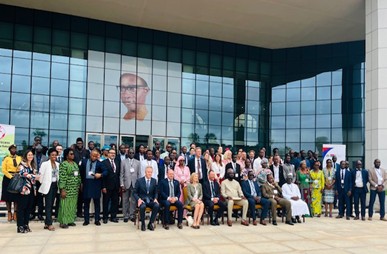
The summit, held in SDKJ conference center in Banjul, brought together representatives from over 20 African and European countries, alongside key organisations including ECOWAS, the European Union, the International Committee of the Red Cross (ICRC), and the International Centre for Migration Policy Development (ICMPD).
The event marked a milestone in regional and international efforts to improve coordination on the search, identification, and support mechanisms for migrants who have gone missing along some of the world’s deadliest migration routes.
Abdouille Sanyang, minister for Interior, speaking at the opening ceremony of the first in-person meeting of National Focal Points on Missing Migrants under the Rabat Process, issued a strong call for global cooperation to address the growing crisis of migrant disappearances.
With over 9,000 deaths and missing cases reported in 2024 alone, the highest in a decade, Sanyang emphasised that the issue is not just about numbers but human lives, grieving families, and broken communities.
Highlighting The Gambia’s own experience as a country of origin, where many young people have vanished along dangerous migration routes, Sanyang urged partners to strengthen cross-border collaboration, improve data sharing, and provide practical support for families searching for their loved ones, calling for collectivity, people-centred action rooted in dignity, justice, and compassion.
Dr. Fernando Gorge Alves d’ Almada, head of Social Affairs at the ECOWAS Commission, emphasised the critical leadership role ECOWAS continues to play in managing migration challenges across West Africa. “We are committed to working with our partners to address this issue which affects almost every ECOWAS member state,” he said.
“The summit comes amid alarming statistics: in 2024 alone, over 9,000 migrants were reported dead or missing along routes crossing the Sahara Desert and the Mediterranean Sea, figures believed to be underestimated,” he added.
Enrica Pellacani, head of Cooperation at the EU Delegation to The Gambia, acknowledged the complexity of the crisis, pointing to ongoing EU support for search and rescue operations and programs aimed at dismantling human trafficking networks. “A multifaceted, human-centred approach is essential,” Pellacani said. She stressed that legal migration pathways and tackling root causes such as poverty and conflict remain priorities in joint efforts.
The ICRC’s Jean-Nicolas Marti, highlighted the human dimension behind the numbers, underlining the anguish of families searching for missing loved ones. He noted that since 2022, the ICRC has worked to establish National Focal Points to improve communication and coordination among states. “Preventing disappearances and providing answers to families must remain at the centre of our efforts,” Marti said.
The summit also underscored the financial and operational challenges faced by humanitarian organisations in sustaining these efforts. Marti urged member states to increase their support to ensure continuity of technical assistance and family tracing programs.
ICMPD’s Jean-Charles de Cordes, senior project manager and coordinator of the Rabat Process, called the meeting an important platform for sharing good practices and strengthening cross-border cooperation. “Only through joint action by countries of origin, transit, and destination can we effectively respond to this humanitarian crisis,” he stated.
“For The Gambia,” he said, which has seen many of its citizens undertake perilous journeys, hosting this event reaffirmed its commitment to addressing the issue at national and regional levels. The country’s dedication to working alongside partners to improve protection mechanisms and reduce the loss of lives serves as a beacon of hope in its cause.
The two-day meeting is expected to pave the way for enhanced operational cooperation, improve search and identification capacities, and stronger support for families left behind. Delegates agreed that collaboration remains key to tackling one of the most urgent migration challenges both Africa and Europe today face.




